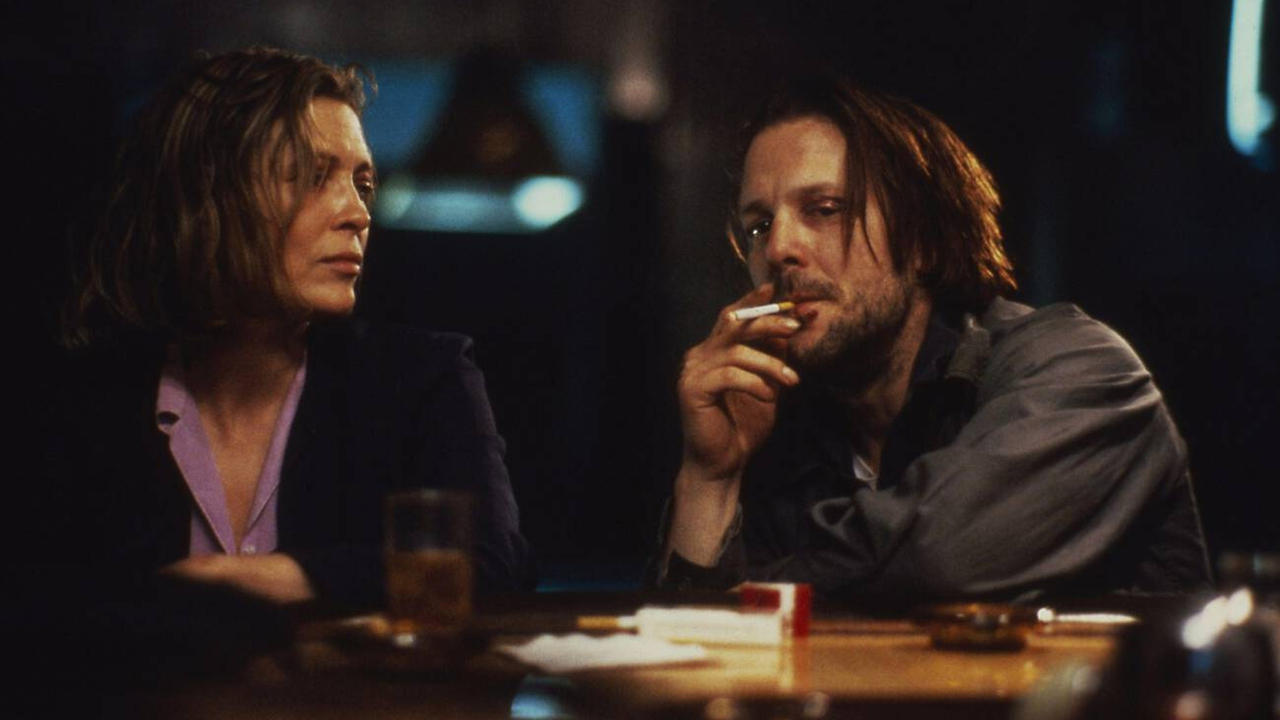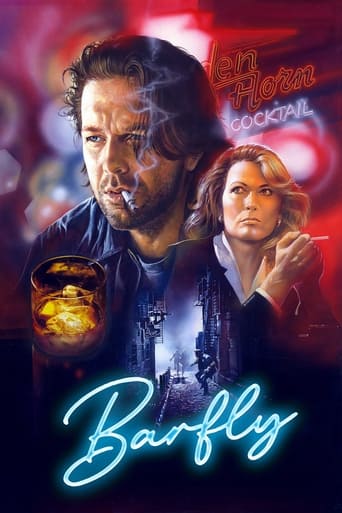Kattiera Nana
I think this is a new genre that they're all sort of working their way through it and haven't got all the kinks worked out yet but it's a genre that works for me.
Linbeymusol
Wonderful character development!
CheerupSilver
Very Cool!!!
Comwayon
A Disappointing Continuation
NateWatchesCoolMovies
Charles Bukowski's Barfly requires a specific thing of it's audience: emphatically try to observe a very particular brand of life, that of the binge drinking drifter in 1970's LA basin area. If you can do this, it's a brilliant piece of work to enjoy, and if you can't, it'll be an abrasively off-putting slog to sit through. I fell smartly into the former category as the subject matter came.. vaguely close to hitting home, and because it's just a fantastic movie in itself. Mickey Rourke was at the top of game during the 80's, and this is one glowing gem of a role for him, one that shows a vulnerable, less macho dipped side of the man no less. Playing a restless, shambling gutter-snipe named Henry Chinaski, he careens through the film consuming any booze he can get his hands on, barely maintaining already dysfunctional relationships and haunting his derelict apartment, as well as that of a fellow rummy he meets in the form of excellent Faye Dunaway, looking equal parts haggard and angelic until we're not sure what we're looking at. Chinaski is of course supposed to be Bukowski himself, as the film and it's fiery script are autobiographical in nature, based on the willfully misanthropic writer's hazy adventures in backwoods Hollywood during that era. Approached by a publisher (beautiful, articulate Alice Krige, who replaced Helen Hunt) with stars in her eyes for the man and his work, Chinaski gets a taste of life on the other side of the tracks, albeit briefly, an interlude he describes as 'a cage with golden bars.' The dives along those strips are his home right to the core, and he's proud of it. The film is episodic, elliptical and open ended, a glimpse through the window of what it must be like for these people for a time, as the camera lovingly follows them about their ways for a while like a fly on the wall, then loses interest, buzzes off and leaves them in peace without rhyme, reason or resolution, unless of course your sensibilities jive with the meandering, barely sculpted story structure, which I loved. The film has little interest in aesthetics or pleasantries either, showing ugly, mottled alcoholics and layabouts who fill the frames around Rourke and Dunaway like brittle garden gnomes adorning the bar, a far cry from the fresh, powdered faces we're used to in Hollywood. "Don't you hate people?" Dunaway laments to him in one scene. "No, but I seem to feel better when they're not around.." he croons back. It's that kind of stinging poetry that gives this film, and Bukowski's career, such lasting weight. Not to be missed.
michaeltrivedi
Barfly is an example of excellent filmmaking. Let me start by explaining the plot.The main character, Hank, is an alcoholic writer, and spends all of his days drinking at the bar, getting into fights, lounging around at home, or writing. After getting kicked out of his neighborhood bar, he met an older lady, played by Faye Dunaway, at a bar down the street. They form a relationship, and he ends up moving in with her. She has emotional problems too, and ends up getting fired from every job she has. Soon, a beautiful woman from a writing agency discovers Hank and offers him the world in exchange for his stories. Hank refuses, and goes back into the life of a bum writer. The movie ends with Hank right back where he started, fighting outside the bar he visits every single day.Now this story is very philosophical and beautiful. Hank being a writer, he can explain the pain and happiness associated with his choices in life. He can examined and analyze other characters he comes across in ways we think, but could never put in words. He is a protagonist we cannot look upto, he has nothing to offer. And yet, there's something beautiful about being down and out. Hank is definitely one of the best characters even depicted on screen, and I highly suggest you watch this movie right now. It may not be for some, or many, but it is one of my person favorites.9 Stars
Predrag
Barfly was written directly for the screen by one of my all-time favorite authors, Charles Bukowski. Mickey Rourke has never given a finer performance than as Henry, a "Bukowski-esque" writer/barfly struggling to survive along with the other dregs of society. Faye Dunaway shines as Wanda, Henry's newly found, (sometimes lover) drinking partner. Directed by Barbet Schroeder, Barfly did not find a large audience but critics and the lucky few to see this film in the theater became instant fans, knowing they have just viewed a small masterpiece.However the real thrill is Dunaway appearing at a time when her Hollywood star was suffering still from "Mommie Dearest". I find her performance here probably one of her best and she captures beautifully the louche attitude of a beautiful woman too attracted to the bottle and heading for oblivion. This film is certainly up there with Bonnie & Clyde, Chinatown and Network in showing what she was capable of when well directed and stretched.Also special mention should be made of the two support actors J. C. Quinn as Chinaski's friend and Alice Krige as the wealthy and attractive publisher attracted to the doomed Chinaski and not realising she is out of her depth when confronted by Dunaway. Add to this a very memorable cast of cheap bar low-lifes who all feed off each other and some smart art direction and camera-work. The several shots of daylight streaming into those dark room long bars when the bar door is opened and the inhabitants react dazedly captures the milieu of their twilight existence perfectly, and the bitter sweet ending of having gone full circle in the story depicts the entrapment of such an existence beautifully.Overall rating: 8 out of 10.
viewsonfilm.com
If Martin Scorsese directed a movie in slow motion and dirtied it up a little more, he'd get the ultimate foray into a humans bout with alcoholism. So here, I give you the little seen gem from 1987, Barfly.Mickey Rourke in the title role, takes method acting to a whole new level. I'm not sure what happened between takes, but I feel that he might have stayed in character, didn't shower, probably wore the same clothes, and went by the name of his lead, Henry Chinaski. He drinks like a fish, inhabits the slumming L.A. bars, and gets into fights with a bartender named Eddie (played effectively by Sly Stallone's brother, Frank Stallone). When he's not fighting, failing to pay his rent, and aspiring to be a writer, he gets the attention of a beautiful older woman (another drunk played by Faye Dunaway as Wanda Wilcox). They form an interesting relationship that anchors a large majority of what's on screen. As they wallow in their drunkenness, Henry is pursued by a detective and a women news writer who wants to publish one of his stories.Almost feeling like a film told in a dreamlike state, Barfly is a character study that revels in irony and self-loathing. It's dirty, free forming, and harbors grubby, all too realistic performances. The side characters are people who you'd find in an alley and kinda look like homeless vagabonds. This is truly Los Angeles at its most depressing and most hideous. The script is based on the writings and life of the famed novelist Charles Bukowski. And the short running time sort of ends and begins in the same exact way. There are some quotable lines, an honest, demented take on the concept of dying, and a cameo by the screenwriter and novelist himself.Ultimately, it's Rourke's shining moment and Barfly succeeds because of him and almost nothing else. During the first half of the proceedings, his inebriated Henry utters the line, "don't worry, no one's loved me yet." Well this critic loved Mickey's realistic, balls out performance. Forget his Oscar nominated turn in The Wrestler. This is "bar" none, his best work.

